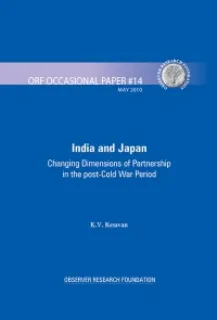The evolution of Japan’s post-war relations with most Asian countries was largely governed by two factors the legacies of the Second World War and the compulsions of the Cold War. The impact of these factors was particularly severe in its dealings with Southeast Asian countries and the prolonged negotiations for just and adequate reparations during the 1950s and 1960s reflected the intensity of their antipathy towards Japan.
Cold War considerations further complicated the normalization of their relations. While the Southeast Asian region posed formidable diplomatic challenges to Japan, South Asia provided a soothing contrast. South Asian countries could view the entry of Japan to the comity of nations with considerable sympathy, since they had not experienced the severity of Japan’s military rule during the Second World War. Even during the Allied Occupation of Japan (1945-52), when India was very much involved in the formulation of policies for Japan as a member of the Far Eastern Commission (FEC), New Delhi argued that an unduly long military occupation would defeat the Allied goals of promoting democratic and liberal elements in Japan. During 1950-51, when the US, compelled by the considerations of the Cold War, decided to draw up a speedy peace settlement with Japan, India expressed its views very cogently. While India was in favour of an early restoration of sovereignty to Japan, it did not want the issue to be clouded by the exigencies of the Cold War.
The re-emergence of Japan as a free country, according to India, was an event of great significance for the whole of Asia and it should not be dictated by any extraneous factors. India declined to participate in the San Francisco Peace Conference held in September 1951 on the ground that the US- drafted peace treaty failed to take due recognition of the wishes of the Japanese people. Instead, India chose to enter into a bilateral peace treaty with Japan in 1952 and it was one of the first countries in Asia to open diplomatic ties with Tokyo.
Over the next six decades, the two countries developed a strong and stable partnership based on mutual respect and understanding. To be sure, during the Cold War period, ideological differences between the two countries created many serious obstacles to the nurturing of warm relations, but since 2000 the interactions have entered a new phase with the two countries coming together to build a global partnership. Until recently, their interests were primarily limited to economic matters like development assistance and trade, but today they are more diversified and cover a wide range of subjects, the salient ones being nuclear disarmament, maritime security, energy cooperation, climate change, counter terrorism, UN reforms and regional community building. The signing of the Declaration on Security Cooperation by India and Japan in October 2008 was a high watermark in the process initiated in 2000. Very few in either of the countries would have expected such a significant development to materialize so rapidly because, until just ten years ago, India hardly ever figured in any Japanese discourse on the emerging Asian security landscape. But today, it is difficult to think of such security discussions in Japan without reference to India. There is a fundamental shift in the Japanese assessment of India’s role in the shaping of a new Asian security architecture. New security and economic convergences have created unprecedented opportunities for further strengthening of ties.

 PDF Download
PDF Download



 PREV
PREV


